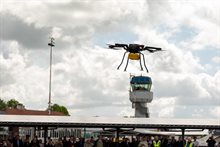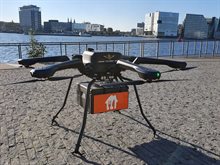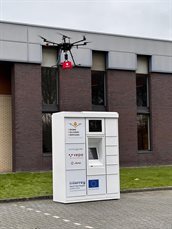Airborne challenges - can we already make deliveries with drones?
In the FNS partner interviews, we feature a partner every week. Our partners give insight into the developments and innovations within their company and their role in 6G Future Network Services. Egbert Swierts of Drone Delivery Services (DDS) kicks off the interview series.
Egbert Swierts from Drone Delivery Services
In corona time, Egbert Swierts and three other entrepreneurs started the company Drone Delivery Services (DDS) to take innovation around autonomous airborne delivery services further. As a drone operator, DDS makes every effort to help parties and get projects in this field moving.
We spoke to Egbert in April 2024 about DDS and its relationship with Future Network Services.
"In corona time, we saw drones being deployed for medical purposes worldwide, for us a great time to also start this to start transporting goods through the air in a smart and safe way. We believe in a future of drone delivery but - mainly due to laws and regulations and the challenges for transport by air - are still working towards actual drone delivery. However, our ambitions are big, we are working from relatively light drones to increasingly heavy ones. Thus, we hope to eventually transport cargo up to 200 kilograms. At the same time, we are trying to incrementally increase the flying distance, from within sight of the pilot to outside it and from 1 kilometre, to 10 kilometres, through to 30 kilometres. The latter is the distance we need to enable transport between cities and to the Wadden Islands. Our dot on the horizon is eventually even passenger transport by air."

Netherlands not ready for drone delivery yet
DDS is at the forefront of autonomous mobility by air. To make this possible, fast, safe and reliable communication over long distances is crucial. This involves dealing with all kinds of building blocks such as technology, training, laws and regulations, customer processes and physical infrastructure. DDS sees many opportunities, but indicates that the Netherlands now needs to take some final steps to make unmanned aviation possible on a large scale. Egbert explains: "The Netherlands is relatively densely populated with large(er) hazards, European regulations are ready but we still need to demonstrate that a number of things can be implemented safely. Think of things like the airworthiness of a drone. But especially reliable communication and separating the drone from other air traffic are big challenges, in FNS we will work on these challenges. We still have a step to take there."
Possible solutions
The last 10 years have been spent working with a radio link between the transmitter and the drone, a reliable system that works well for short distances but is not ready for the future possibilities and customer needs with drones.
"We are now looking at alternatives such as a new network of ground stations, working with satellite or using the nationwide telecommunications network. These - along with reliable connectivity - are key research questions."
DDS and FNS
DDS is work package leader in Program Line 3, Work Package 1: Transport Hubs, where it expects - as an end-user - to also submit wishes for unmanned aviation to work properly over the telecommunications network. This work package involves collaboration with parties such as TNO, Ericsson and Odido. "Eventually, the results of this will also become more widely applicable also for road and water transport. We are already deploying our knowledge and network around air operations in FNS. We are now still in the initial phase and will look at how to make the infrastructure ready for our application," Egbert adds.
"What also particularly appeals to us about FNS is the ambition that there will be more European and Dutch IPs and development in the 6G network, so that we are less dependent on America and Asia as with 5G."

Getting in as soon as it starts flying
As a drone operator, DDS is looking closely at current customer demand. DDS has built a consortium of interested parties and is currently focusing on drone delivery of urgent (medical) products as well as transport between the mainland and the Wadden Islands. For now, it is focusing on projects with a more social base such as solutions for keeping rural areas liveable. Often together with local authorities. Egbert explains: "Maintaining the standard of living in these rural areas is increasingly difficult. GPs and pharmacists moving away, libraries centralising, but also the reduction of public transport and the difficulty of finding staff are reasons to look at drone delivery options in these areas. This requires quite a bit of out-of- the box thinking."
Sobering message
Delivery by drones is still under development, but some tests and pilot programmes have already been carried out around the world. Their status may vary depending on the country and regulations. DDS has so far mainly tested and conducted pilots with a single drone, no concrete applications with delivery drones are operational yet. "It sometimes seems like a lot is already possible around delivery with drones, in other countries some things are already happening. There are parties that have ambitions for entire highways of drones, and our customers actually want to start right away as well.
Unfortunately, we often start our talks with a sobering message and start working step by step to make the future of drone delivery possible."

